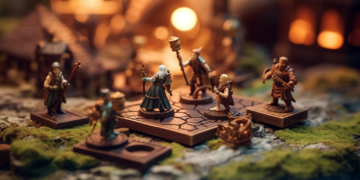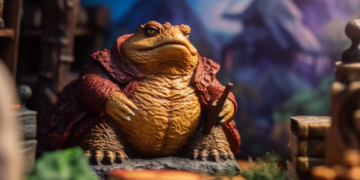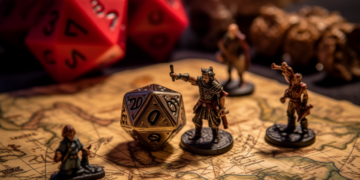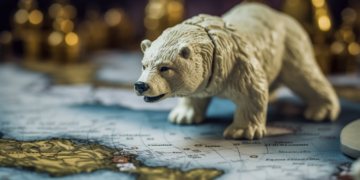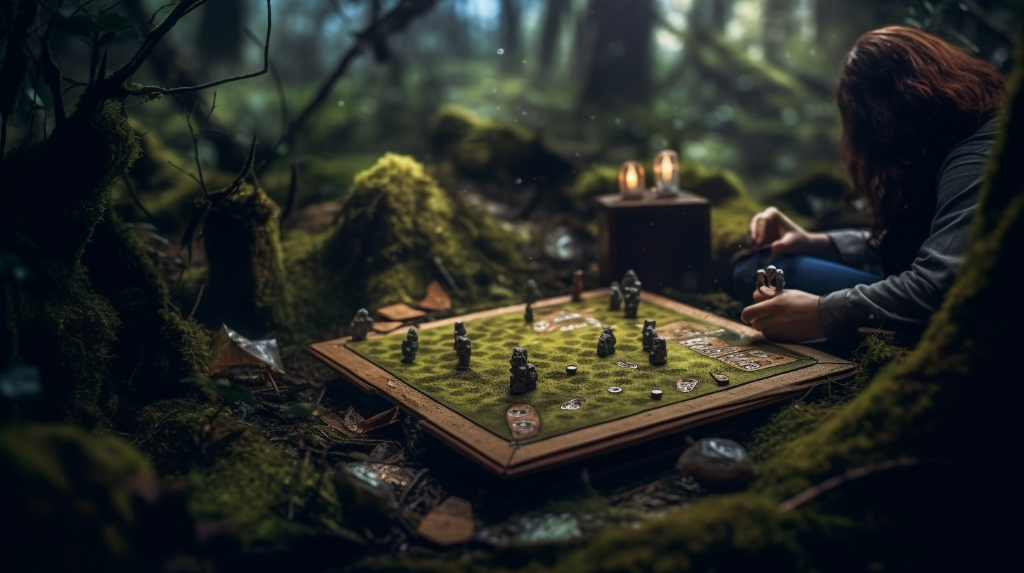
Far from the hustle and bustle of crowded city streets and the rigid structure of civilization, there exists a world untamed and brimming with raw, natural beauty. Here, where the howling of wolves serves as a lullaby and the rustling of leaves underfoot is your compass, is where the heart of an outlander thrives. This is a world of survival, of rustic simplicity, and a wanderlust that sings the song of the wild. It’s in this untamed wilderness that the outlander of Dungeons and Dragons 5e finds their home.
A Deep Dive into the Outlander’s Origin
Imagine growing up in the wilds, where the rules of nature are your only law and survival is your only goal. This is the reality of the outlander. From a young age, they learn to read the signs of the land, to track game, and to forage for food. They become one with the wilderness, their senses honed to a razor’s edge and their survival skills unmatched. Can you feel the rhythm of the wild heartbeat? That’s the pulse of an outlander’s origin.
The Spirit of the Outlander
What does freedom taste like? Ask an outlander, and they might tell you it tastes like fresh rain on pine leaves or the first bite of a just-caught trout. Outlanders embody a love for freedom that’s as vast and wild as the landscapes they roam. They thrive on self-reliance and bear a strong, almost spiritual connection to the natural world. To an outlander, the wilderness is not just a location, it’s a state of mind. But what does it truly mean to have the spirit of an outlander?
Key Features of an Outlander
The Outlander in Dungeons and Dragons 5e is a unique character with a set of defining traits and skills. These characteristics not only shape the Outlander’s role within a campaign but also add depth and nuance to their persona. So, what exactly sets an Outlander apart?
Let’s take a journey into the wilderness and discover the essence of an Outlander.
Survival Skills
As an Outlander, you’re not merely surviving in the wild – you’re thriving in it. The wilderness is your home, and you’ve honed your skills to adapt and excel in it. From tracking a deer through dense forests, foraging for edible plants, to predicting weather changes, your survival skills are unparalleled. But these aren’t just skills – they’re a testament to your resilience, resourcefulness, and innate connection with nature.
Rustic Hospitality
Imagine this: after a long day of travel, you stumble upon a secluded village nestled in the wilderness. As an Outlander, you’re no stranger to these rural settlements. You understand their way of life, their struggles, and their customs. You share stories, exchange wisdom, and form bonds. This is the essence of Rustic Hospitality – a shared kinship with folk who live off the land.
But remember, this isn’t about exploiting these connections for personal gain, but about forming genuine relationships and fostering mutual respect. After all, isn’t that the true spirit of an Outlander?
| Feature | Description |
|---|---|
| Survival Skills | Expertise in hunting, tracking, foraging, and other wilderness survival techniques. |
| Rustic Hospitality | Ability to find assistance and companionship amongst other outlanders and rural folk. |
| Wanderer | Excellent memory for maps and geography. Can always recall the general layout of terrain, settlements, and other features. |
| Origin | Has a specific origin from the wilderness that shapes their perspective and abilities. |
Building an Outlander Character
Have you ever wondered how to mold a character that is one with nature, a master of survival and a wanderer of the wilds? The process of creating an outlander character in D&D 5e is a journey in itself, a journey that leads you through untamed forests and uncharted territories of your imagination. Let’s embark on this journey together.
First and foremost, choose a race that aligns with the outlander’s inherent connection to the wild. Elves, Half-Orcs, or Goliaths make excellent choices, but don’t let that limit your creativity. Remember, the beauty of D&D is its limitless possibilities.
Next, focus on your ability scores. Strength and Constitution are vital for survival in the wilderness, while Wisdom helps with perception and interaction with the natural world. Use the standard set (15, 14, 13, 12, 10, 8) or roll 4d6 and discard the lowest die, allocating these scores as you see fit.
Finally, choose your skills, tool proficiencies, and starting equipment. Survival, Athletics, and Perception are typical skill choices, while a musical instrument represents the cultural side of your outlander. For starting equipment, consider items that aid in survival like a hunting trap or a staff.
Roleplaying an Outlander
Roleplaying as an outlander is an exhilarating experience, one that allows you to embrace the untamed side of your character. But what does it mean to be an outlander in the world of D&D?
Outlanders are, at their core, survivors. They thrive in the wilderness and often find the confines of civilization suffocating. They value freedom, independence, and the raw beauty of nature. When roleplaying, these are the values that should guide your character’s actions and decisions.
Outlanders also have a deep respect for the natural world and its creatures. They hunt for survival, not for sport, and strive to maintain a harmonious balance with nature. This respect often extends to their interactions with other races and characters, leading to relationships built on mutual respect and understanding.
Their views on civilization can vary. Some may view it with disdain, preferring the honest brutality of the wild over the deceitful comforts of society. Others may see it as a necessary evil, a place to gather information and resources before returning to their beloved wilderness. This dichotomy can lead to interesting conflicts and character development opportunities.
Tips for Roleplaying an Outlander
- Emphasize your connection to the wild. Whether it’s tracking a beast or foraging for food, showcase your survival skills.
- Interact with nature. Speak to animals, respect the balance of ecosystems, and show reluctance to harm the environment.
- Express discomfort or unfamiliarity in urban settings. The noise, the crowds, and the lack of nature can all be overwhelming to an outlander.
- Value freedom and independence. Outlanders are not typically followers, and they’re not fond of restrictions or being told what to do.
- Use your Rustic Hospitality feature. It’s a great way to gather information, find shelter, or make allies.
The Outlander’s Place in the Game
Have you ever wondered how an Outlander character fits into a typical D&D 5e campaign? Well, it’s like a wolf among deer; it’s different, but it brings a unique set of skills that makes it indispensable. Outlanders, with their survival skills and deep connection to nature, can prove essential in wilderness exploration and survival scenarios. They are the party’s eyes and ears in the wild, the guiding light in the darkest of forests, and the compass in the most confusing of terrains.
However, an Outlander’s strengths in the wilderness may sometimes become weaknesses in city settings or intricate social situations. Their rustic simplicity, while endearing, may not be best suited for diplomatic negotiations or deciphering complex political scenarios. But isn’t that the beauty of D&D? The diversity of backgrounds, each with their own strengths and weaknesses, coming together to form a dynamic, versatile party.
Famous Outlanders in D&D
Looking for some inspiration for your Outlander character? Why not take a leaf from the book of some of the most famous Outlanders in D&D lore? Each of these characters brings the Outlander background to life in their own unique way, painting a vivid picture of what it truly means to be an Outlander.
- Drizzt Do’Urden – A drow ranger who left the Underdark and his evil kin behind, Drizzt is a classic example of an Outlander. This iconic character from R.A. Salvatore’s novels is known for his exceptional survival skills and his deep connection with the wild.
- Minsc – A ranger from the Icewind Dale, Minsc quickly became a fan-favorite with his love for animals and his strong moral compass. His giant miniature space hamster, Boo, is a testament to his Outlander background.
- Artemis Entreri – Although known as an assassin, Artemis’s skill in surviving alone and his self-reliance make him a clear Outlander. His life in the wilderness has honed his senses, making him a formidable foe.
Embracing the Wild – The Final Word on the Outlander
In the end, the Outlander background in D&D 5e offers a unique and exciting role-playing experience. It’s an invitation to step into the wild, to embrace nature, and to become one with the wilderness. So, why not take the plunge? Create your own Outlander character, venture into the wild, and let the adventure begin. Remember, in the world of D&D, the only limit is your imagination.


